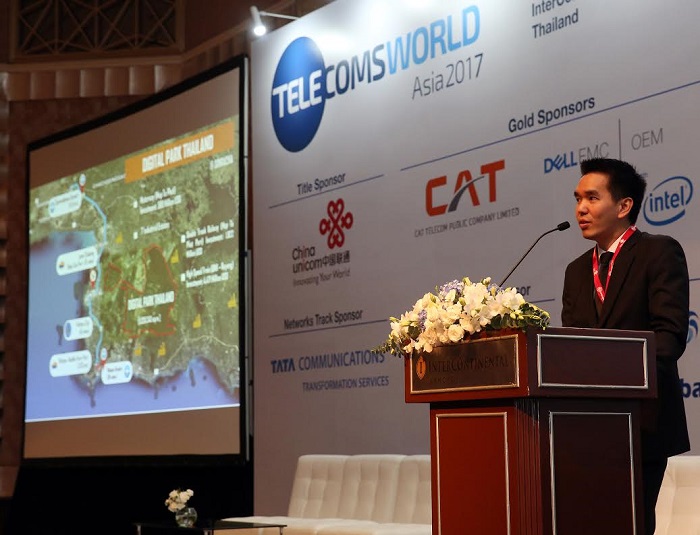CAT News
ศูนย์รวมข้อมูลข่าวสารและกิจกรรมต่างๆ เกี่ยวกับกิจการสื่อสารโทรคมนาคม
CAT Promotes Digital Park Thailand – Megaproject to Pave Way for Digital Industry Development – at Telecoms World Asia 2017
04.04.2017

CAT Telecom Public Company Limited (CAT) introduced the “Digital Park Thailand” project to telecommunication entrepreneurs participating in Telecoms World Asia 2017. The innovation center is expected to attract 60 billion baht of foreign investment within five years and lead to the further rise of other industries.
Digital Park Thailand is initiated under the collaboration of CAT, the Ministry of Digital Economy and Society and the Industrial Estate Authority of Thailand (IEAT). Located in a 600-rai area in Si Racha District, Chonburi, the Park will be the hub of digital investment and innovation.
.jpg)
“Not only will Digital Park Thailand play a supportive role in the investment in digital industry, but it will also improve the potential of human resources and promote the development and creation of digital products and services, which will drive growth in other industries, in line with the establishment of the Eastern Economic Corridor (EEC),” said Dr. Wongkot Vijacksungsithi, Executive Vice President - Corporate Strategy Group, CAT.
“The investment in digital industry will motivate more talented individuals to come to Thailand and share their know-how, and this will help improve our human resources and inspire new innovations. Today, digital innovation plays an important role in almost every industry. The automotive industry, for example, which is one of the country’s core sectors, will considerably rely on autonomous car-related technology. Electronic devices and electrical appliances will involve Internet of Things (IoT), while technologies concerning data management and analysis, such as Artificial Intelligence (AI), will influence all business sectors.” said Dr. Wongkot.
Located in Bangkok’s nearby district of Si Racha, Digital Park Thailand offers a convenient route to access, as it is less than an hour away from Suvarnabhumi Airport and U-Tapao Rayong-Pattaya International Airport. Besides, the Thai government has allocated budgets for transportation and motorway upgrades, as well as the high-speed rail project, making travel easier in the future. Si Racha is surrounded by several industrial estates and universities, which will actively foster innovation in the Park.
Digital Park Thailand, of which the construction is due to begin in 2018, will be divided into four zones: 1) University 4.0 & Digital Academy, where renowned international and local universities will offer digital-related courses and laboratories will be established under collaboration between universities and the private sector; 2) Digital Innovation Space, where digital innovation investment will take place; 3) Living Space comprising of residences, hotels, a shopping mall and a sport complex. Three investment models will be executed in the Park, including 1) The government will invest in basic infrastructure and common facilities; 2) CAT will invest in telecommunication and digital infrastructure and data center; 3) Private sectors’ investment.
Several incentive packages will be offered to business operators in Digital Park Thailand, including corporate and personal income tax privileges, state-run one stop services, simplified VISA and work permit procedures.
Not only Digital Park Thailand, but, according to Dr. Wongkot, CAT is this year developing solutions for ‘Smart Sities,’ which will begin in six provinces, including Phuket, Chiang Mai, Khon Kaen, and three EEC provinces – Chonburi, Rayong and Chachoengsao.
(3).jpg)
“The work has already begun in Phuket, where CAT and the Ministry of Digital Economy and Society are installing free WiFi all over the city. We are also developing the Lora network to support Internet of Things (IoT). All of CAT’s technologies – 3G, 4G WiFi and Lora – have already been prepared for smart city. Then, we will install sensors to collect whatever data we want, such as sensors to monitor water levels, weather and traffic conditions, and security cameras, etc. The data will be integrated and sent to the center. Then, it will be analyzed and actions will be taken accordingly. For example, if a canal sensor detects that the water level exceeds the predetermined limit and so there is risk of flooding, the data will be sent to the central control. Then, alerts will be sent to villages and orders could be made to open the floodgate,” Dr. Wongkot added.
The symposium took place at InterContinental Bangkok Hotel on 21-22 March.
เว็บไซต์นี้ใช้คุกกี้
เว็บไซต์นี้ใช้คุกกี้ เพื่อสร้างประสบการณ์นำเสนอคอนเทนต์ที่ดีให้กับท่าน รวมถึงเพื่อจัดการข้อมูลส่วนบุคคลเพื่อให้ท่านได้รับประสบการณ์ที่ดีบนบริการของเว็บไซต์เรา หากท่านใช้บริการเว็บไซต์นี้ต่อไปโดยไม่มีการปรับตั้งค่าใดๆ นั่นเป็นการแสดงว่าท่านอนุญาตยินยอมที่จะรับคุกกี้บนเว็บไซต์และนโยบายสิทธิส่วนบุคคลของเรา




